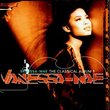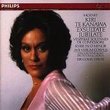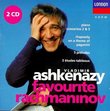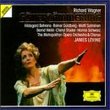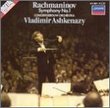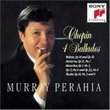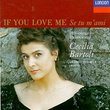| All Artists: Erich Kleiber, Elisabeth Grummer, Rita Streich, Hans Hopf Title: Weber: Der Freischutz / Kleiber, Grummer, Streich, Hopf Members Wishing: 0 Total Copies: 0 Label: Opera D'oro Release Date: 11/17/1998 Genre: Classical Style: Opera & Classical Vocal Number of Discs: 2 SwapaCD Credits: 2 UPC: 723723409621 |
Search - Erich Kleiber, Elisabeth Grummer, Rita Streich :: Weber: Der Freischutz / Kleiber, Grummer, Streich, Hopf
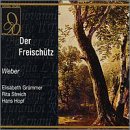 | Erich Kleiber, Elisabeth Grummer, Rita Streich Weber: Der Freischutz / Kleiber, Grummer, Streich, Hopf Genre: Classical
|
Larger Image |
CD DetailsSimilarly Requested CDs |
CD ReviewsThe OTHER Gruemmer "Freischutz" L. E. Cantrell | Vancouver, British Columbia Canada | 01/21/2004 (5 out of 5 stars) "Source: 1955 radio broadcast performed before a rigidly disciplined audience.
Sound quality: Pretty good mono. Cast: Max, Second Hunter in Prince Ottokar's Forest - Hans Hopf (tenor); Kaspar, First Hunter - Max Proebstl (bass); Agathe, betrothed to Max - Elisabeth Gruemmer (soprano); Aennchen, Agathe's friend - Rita Streich (soprano); Samiel, the demonic Black Huntsman - Richard Muench (actor); Ottokar, a German prince reigning in comparative peace not long after the Thirty Years War - Alfred Poel; Kuno, Prince Ottakar's Head Forester and Agathe's father - Heiner Horn; Hermit, a forest-dwelling wise man - Kurt Boehme; Kilian, a rich peasant - Kurt Marschner; Four Bridesmaids - Brigitte Kaltwasser / Lucy Schulz / Marga Weissenfeld / Marties Siemeling; Two Huntsmen - unidentified. CONDUCTOR: Erich Kleiber with the Cologne Radio Symphony Orchestra and Cologne Radio Chorus. Documentation: No libretto. Sketchy summary of plot. Next to nothing on the performance. Nothing on the performers. This recording of "Der Freischutz" seems to have been overshadowed by the Furtwaengler recording with much the same cast. Amazon reviewers have rated that version very highly, despite its wretched sound reproduction. This recording provides much better sound and three of the four main principals used by Furtwaengler: Gruemmer, Streich and Hopf. Among the singers, the star of the set is undoubtedly the luminous Elizabeth Gruemmer. The ability to hear her Agathe is, in itself, sufficient justification to acquire this set. Rita Streich does a lovely turn in her relatively small part. Hans Hopf, who can sometimes make my teeth itch, does quite well with the bone-headed tenor part. The principal performer not duplicated on the Furtwaengler set is Max Proebstl as the eerie huntsman, Kaspar. My one small criticism of Proebstl is, oddly enough, that he sings too well. Kaspar is the first iteration of that kind of operatic caveman later patented by Wagner under the names of Fafner, Hunding and Alberich. Ideally he should be a coarser, scratchier fellow than the comparatively suave tempter offered by Proebstl. The conductor is a great master, Erich Kleiber, and this recording must have been one of his last major projects before his sudden death in January 1956. Kleiber's inclination was toward classicism, as opposed to the romanticism of Furtwaengler. To my ear, at least, his approach emphasizes the muscality and sheer flow of melody in this very melodious opera over its undoubted romanticism. Opera d'Oro presentations range from excellent to abysmal. This is one of their best. Kleiber, Gruemmer and decent sound = five stars." |

 Track Listings (23) - Disc #1
Track Listings (23) - Disc #1